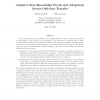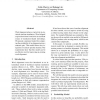978 search results - page 18 / 196 » Knowledge, Probability, and Adversaries |
STOC
1998
ACM
13 years 11 months ago
1998
ACM
Abstract. Loosely speaking, an interactive proof is said to be zeroknowledge if the view of every “efficient” verifier can be “efficiently” simulated. An outstanding open ...
ICDCS
2007
IEEE
14 years 1 months ago
2007
IEEE
Although the content of sensor messages describing “events of interest” may be encrypted to provide confidentiality, the context surrounding these events may also be sensitiv...
FLAIRS
1998
13 years 8 months ago
1998
In this paper wesuggest a wayof using the rules of System P to propagate lower bounds on conditional probabilities. Usinga knowledgebase of default rules whichart, consideredto be...
TCC
2009
Springer
14 years 8 months ago
2009
Springer
In the setting of secure computation, a set of parties wish to securely compute some function of their inputs, in the presence of an adversary. The adversary in question may be st...
ACL
2003
13 years 8 months ago
2003
Word alignment plays a crucial role in statistical machine translation. Word-aligned corpora have been found to be an excellent source of translation-related knowledge. We present...


